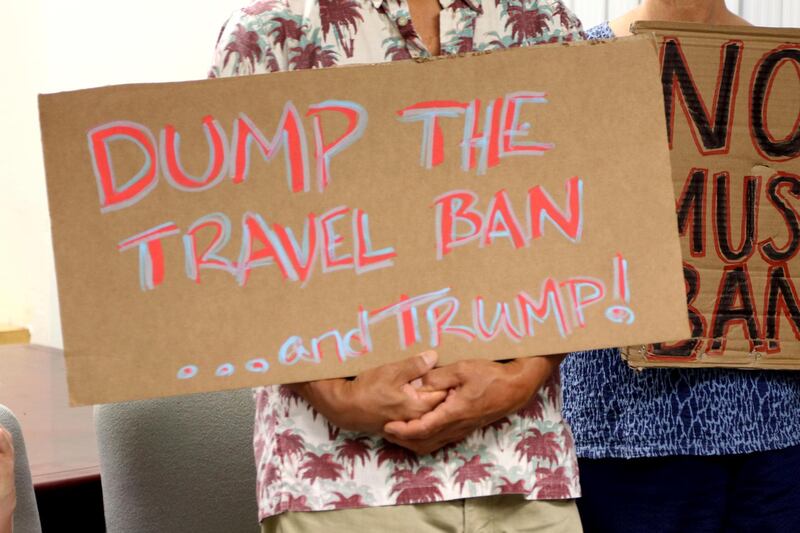A second US federal judge on Wednesday blocked the latest version of president Donald Trump’s travel ban, citing the Mr Trump's own tweets as evidence that it remained an unconstitutional policy designed to discriminate against Muslims.
The decision follows a similar ruling in Hawaii, which imposed a nationwide restraining order on the new restrictions just hours before they were due to come into effect on Wednesday.
US district judge Theodore Chuang, sitting in Maryland, said Mr Trump’s public comments undermined the administration’s claims that the third travel ban — set out in a presidential proclamation — was based on national security considerations, such as the country’s ability to screen travellers and to share information with the US.
“Rather, they cast the proclamation as the inextricable re-animation of the twice-enjoined Muslim ban,” he wrote in a 91-page opinion accompanying his order.
It marks the third time the administration has had its travel restrictions overturned by the courts. Opponents argued that each revision has been nothing but window dressing designed to mask the fact that the provisions are motivated by a desire to discriminate against Muslims.
________________
Read more:
[ Trump's new travel ban: Adds Chad, Venezuela, North Korea and removes Sudan ]
[ Venezuela foreign minister slams new US travel ban as 'aggressive' and 'illegal' ]
________________
Mr Chuang agreed.
He pointed out that the government’s own evidence showed that no one from the designated countries — Somalia, Sudan, Yemen, Iran and Libya, as well as Chad, North Korea and Venezuela — had carried out a terrorist attack on US soil in 40 years.
And Mr Chuang said the administration had not explained why Somalia had been included when officials admitted it was properly sharing information.
In particular, he said his decision was based on Mr Trump’s own stance. He included in his argument one of the president’s favourite, apocryphal anecdotes about Gen John Pershing in the Philippines in the first half of the 20th century. He is reputed to have used an unusual method to put down an uprising.
“Particularly where, in August 2017, president Trump tweeted a statement that a method hostile to Islam — shooting Muslims with bullets dipped in pig’s blood — should be used to deter future terrorism, there is no record of public statements showing any change in the president’s intentions relating to a Muslim ban,” he wrote.
Ultimately, he concluded, the third iteration remained too close to the first two orders which had already been blocked.
The decisions in Hawaii and Maryland represent temporary restraining orders, essentially allowing time for higher courts to consider the constitutional implications of the policy.
Each is slightly different in its sweep — the Hawaii decision allows the government to impose its restrictions on North Korea and Venezuela, for example. But taken together, they indicate that the two judges believe the campaigners have a stronger case than the Trump administration.
A spokesman for the department of justice has already said it will appeal.
“Today's ruling is incorrect, fails to properly respect the separation of powers, and has the potential to cause serious negative consequences for our national security,” he said.
Campaigners said they were already preparing for the next round of the legal battle.
Hakim Ouansafi, chairman of the Muslim Association of Hawaii, which brought one of the successful cases, said the win was bittersweet.
“We are very pleased that this thing has been blocked. It affects 150 million people,” he said. “It is a victory for everyone who believes in freedom of religion and who is against discrimination."
But, he added: "At the same time we are prepared for this president to come up with version four.”
Becca Heller, director of the International Refugee Assistance Programme, one of the plaintiffs in the Maryland case, said: “No matter how many times the administration tries to dress it up in a different outfit, it’s still a Muslim ban.
“We will continue challenging it until this cruel and senseless policy is indefinitely blocked. We’ve cleared our schedules.”






